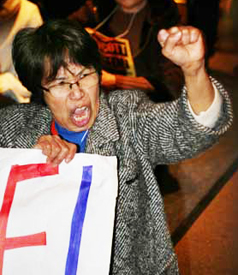San Francisco, California – AFL-CIO President Richard Trumka and UNITE HERE President John Wilhelm joined 1400 hotel workers and their supporters last week as they rallied and marched to the San Francisco Hilton demanding a fair contract. Over 100 protesters, including Trumka and Wilhelm, were then arrested for sitting in and blocking the doors. The action culminated in the launch of a boycott of the hotel, one of the city’s most luxurious.
The Hilton march and arrests are a preview of a spring of growing conflict between workers and the giant chains that now own and operate the city’s Class A hotels. Although San Francisco has seen more of that conflict over the last six months than other cities, it is now spreading around the country. By the summer, it may involve a confrontation among the hotels and over 40,000 workers in at least nine cities.
The contract with San Francisco’s hotel union, UNITE HERE Local 2, expired on August 14. Since then, Local 2 has been trying to bargain a new agreement in the middle of an economic depression. Last fall, hotel workers’ Local 2 members struck, and then began boycotts, at three other Class A hotels – the Grand Hyatt, the Palace and the St. Francis.
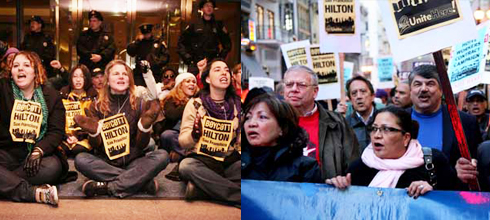
San Francisco’s largest hotels are demanding cuts in health and retirement benefits, and increased workloads, saying that the economic crisis has reduced tourism in the city. The luxury hotel chains want workers to begin paying for their health care premiums – $35/month this year, $115/month next year and $200/month the year after. A typical San Francisco hotel worker earns $30,000 per year, and many can’t work a full 40-hour week.
“Negotiations are going nowhere,” declared Elena Duran, a housekeeper at the Palace and member of the union negotiating committee. “They’re trying to take away our health benefits, to reduce our hours, from eight to four hours, and to combine classifications, so we’ll have to do the jobs of two people. We’re saying no to all those things. We want a fair contract and quality, affordable healthcare coverage. If they can pay a CEO $4 million, they can afford our health coverage.”
Areola Benevidez, a worker at the St. Francis, said, “We are ready to fight and ready to strike. I need the insurance for my kids and for me too.”
According to Local 2 President Mike Casey, “The hotels are trying to exploit the bad economy to lower levels of benefits. That’s just not acceptable for corporations that are making significant profits, even now.” The owners of the Hilton chain, the Blackstone investment group, told Wall Street analysts recently that it had $12.6 billion in available capital. CEO Stephen Schwarzman was given a compensation package of $1.39 billion in 2008.
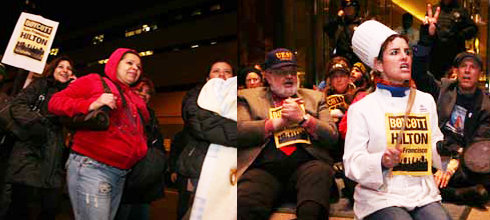
Other chains have also reported profits. Over the first nine months of 2009, Starwood Hotels and Resorts, which manages the Westin St. Francis, earned $180 million. Starwood also manages three other San Francisco Class A hotels. The owner of the St. Francis, Strategic Hotels and Resorts, saw $11 million in earnings during the same period. The company bought the hotel for $439 million in 2006. Large hotels are often owned by a group of investors, and then managed by a hotel chain.
The Hyatt was the first hotel to be struck, in November, on the day the corporation’s owners, the Pritzker family, made an initial public offering of 38 million shares of stock. As a result, the family received over $900 million. Penny Pritzker was treasurer for the election campaign of President Barack Obama.
While the chain’s net income fell by 36 percent in 2009, it made between $168 and $336 million in each of the previous five years. Hyatt CEO Mark Hoplamazian was paid $6.7 million in 2008. Hyatt shocked hotel workers nationwide in August when it fired all its housekeepers at its three Boston hotels, replacing them with workers earning half their wages.
Casey predicts that the conflict between the union and the hotels will grow and spread beyond San Francisco. “By summer, workers in eight other cities are going to have their contracts up at the same time, so the employers are going to get a lot more than what they bargained for,” he explained. “We gave them an opportunity in 09 to get a deal done and avoid this fight. They elected not to sign a shorter, cheaper deal, so we’re going to spend the next six to eight months fighting them – as long as it takes.”
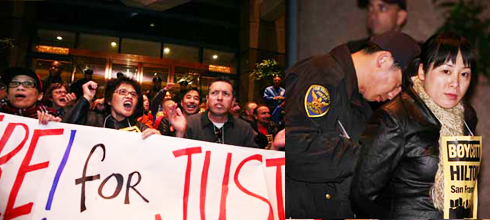
Contracts have already expired in Chicago and Los Angeles. As the summer approaches, they will then expire in Toronto, Minneapolis, Monterey, Vancouver, Honolulu and Washington, DC. This repeats the scenario of 2006, in which the union negotiated with the giant hotel operators virtually simultaneously, in the same set of cities.
That prospect was so threatening to hotel operators in 2004, that when the San Francisco local proposed that its contract terminate at the same time as the agreements in other cities, they locked out union workers for nine weeks. That proved a disastrous strategy. Ultimately, even Mayor Gavin Newsom, who’d received large campaign contributions from the hotels, declared he wouldn’t set foot inside any of them until they agreed to a new contract.
This year, the hotels aren’t negotiating as a group, which now affords the union the opportunity to take them on one by one. That has led to limited strikes, followed by boycotts, in chains targeted by the union. “A lot of business has been moving out of those hotels,” Casey said. “We’re going to try to push the business to other places, but keep it in San Francisco if we can, and make examples of some of these guys that have been the leaders of the pack in fighting us.”
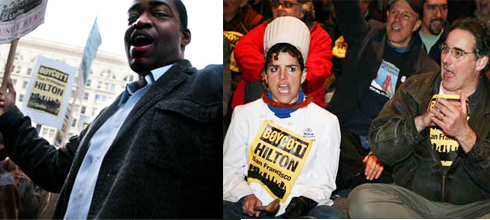
The union didn’t strike the Hilton, however, and is not likely to strike others for the time being. “Occupancy is really low right now. It makes little sense for us to strike a hotel when it’s at 25 percent or 30 percent,” Casey explained. “Moving into spring, we’ll do more of the two-day or three-day strikes. We may even do some open-ended strikes. We’ll also have ongoing, longer demonstrations – what we call sieges – that last from 6 in the morning until 10 at night. This is building up to spring and summer, when we’ll have the other cities lined up.”
During that time, however, the union will be working without a contract. For many unions that is a threatening prospect, since the employer no longer has to deduct union dues or abide by provisions like the grievance procedure. “We went two years without a contract between 04 and 06,” Casey said. “This is nothing. Our members have decided this is worth the wait, to outlast these guys and get the deal that we want. Our union has a tradition of fighting.”
Essay Photos: Copyright David Bacon.
Join us in defending the truth before it’s too late
The future of independent journalism is uncertain, and the consequences of losing it are too grave to ignore. To ensure Truthout remains safe, strong, and free, we need to raise $43,000 in the next 6 days. Every dollar raised goes directly toward the costs of producing news you can trust.
Please give what you can — because by supporting us with a tax-deductible donation, you’re not just preserving a source of news, you’re helping to safeguard what’s left of our democracy.
